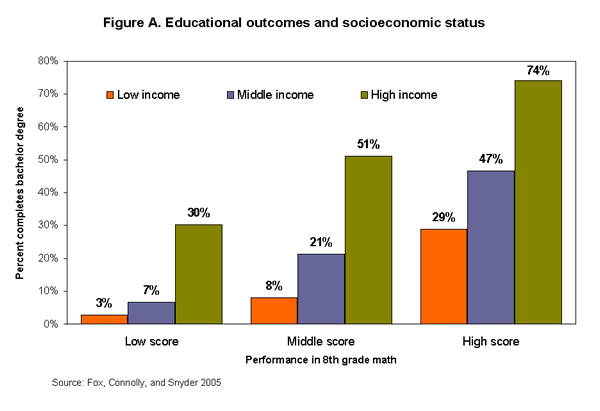What if you were a good student but knew you weren’t going to be able to go to college?
I was fortunate enough for most of my life to know that if I wanted to get a higher education, I would be able to. Thanks, Mom and Dad. It’s hard for me to imagine working hard in middle school and high school if I didn’t have that goal in mind, but that’s the path that many grow up with.
The above graph are the results of a study by the Department of Education started in 1988. It shows that low-income students are most likely not to complete college – despite doing well in 8th grade. It’s a much different story for high-income students.
The Department tracked student progress in 8th grade and through high school and college over the next 12 years. Only 3% of students, from low income families, with low 8th grade math performance, completed college. Compare that to students with the same math performance but from high income families. Thirty percent finished college. That’s ten times more than the former.
What’s worse is that many low-income students who had high math performance still didn’t complete college. The percentage of college completion for low-income, high math students was still lower than high-income, low math students.
[via @golan]


 Visualize This: The FlowingData Guide to Design, Visualization, and Statistics (2nd Edition)
Visualize This: The FlowingData Guide to Design, Visualization, and Statistics (2nd Edition)

Good post Nathan. There are a lot of problems with kids in poverty and you pointed out a good one. This is why there is usually generational poverty. While we would like to think that upward mobility is a reality in the US, but for many poor students, regardless of ability, they just don’t have that option or support to get to and stay in college (poverty is the debate topic for this year and I coach debate, so needless to say I’ve been researching this as well).
Hi Paul,
Interesting stats. But if the study is based on grades, they do point to the likelihood that performance scores at lower-performing schools (where the economically challenged are concentrated) have lower standards, particularly in math.
How well are the top students at the poorer schools really being prepared relative to the more affluent cohort?
They used the National Assessment of Education Progress (NAEP) to measure proficiency. The full report is here [PDF]:
http://nces.ed.gov/pubs2005/2005050.pdf
But yeah, there’s a disparity in quality of education I am sure. Slightly related, Act I of “This American Life”:
http://www.thisamericanlife.org/Radio_Episode.aspx?sched=1311
Interesting, though the graph is mislabeled. What it calls “income” is really socioeconomic status which, according to the source document, is “a composite score on parental education and occupations, and family income”. If income really describes most of the variation, it would be nice to see it alone, rather than in a composite score.
Also, compare the above graph with the second graph in this post, http://yglesias.thinkprogress.org/archives/2009/08/parental-income-and-educational-attainment.php, which shows a much smaller, though not insubstantial, income effect on college enrollment (not degree completion).
Pingback: SES trumps GPA « Echolocation
Pingback: Gravity’s Rainbow » Blog Archive » What I’ve Noticed
I un-pivoted the raw data from the report, and uploaded it to: http://visualizefree.com/show.jsp?id=dDgDSAbN
Then, I created an interactive visualization that allows you to play with the numbers a bit: http://visualizefree.com/share.jsp?id=hdmlOoDQ
Pingback: Help The Teak Fellowship; Meet Great Women | DinnerGrrls.org
Interesting observation. It seems that you are trying to conclude that low income is an impediment to college completion. These days, vitually any capable student can attend some college. I think you may be confusing correlation with causation. It is possible, and I would argue likely, that if you reevaluated the data you would find that the likelihood of completing college is correlated with whether the parents completed college, and that income is correlated with educational level of the parents. Therefore another conclusion, or pehaps more accurtely, another theory is that college completion is a function of how much the parents value education.
you must be new here :)